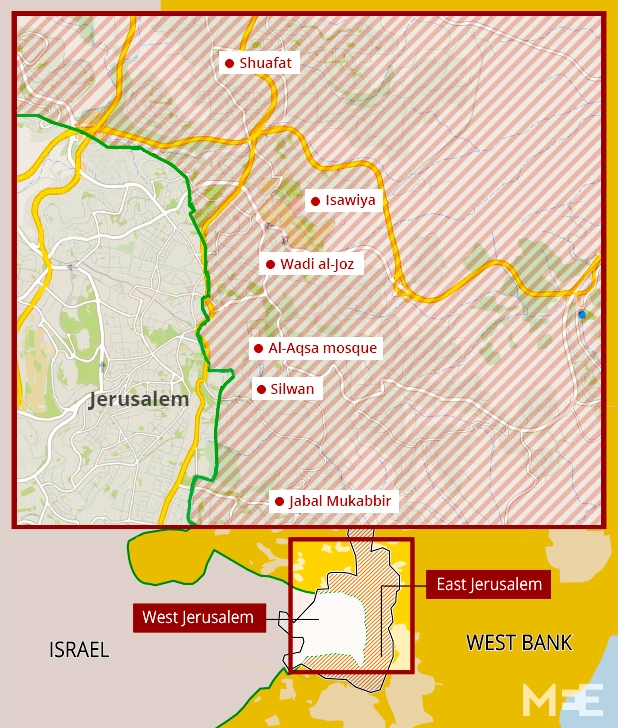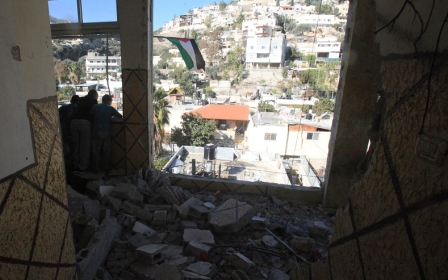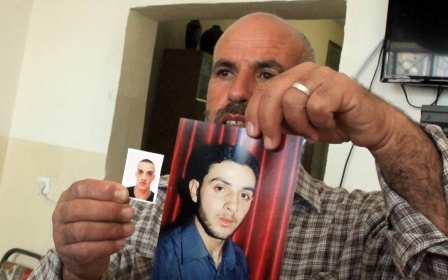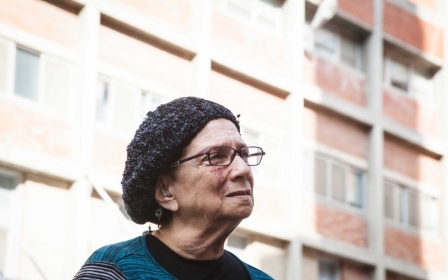Tales of indignity, total despair from East Jerusalem
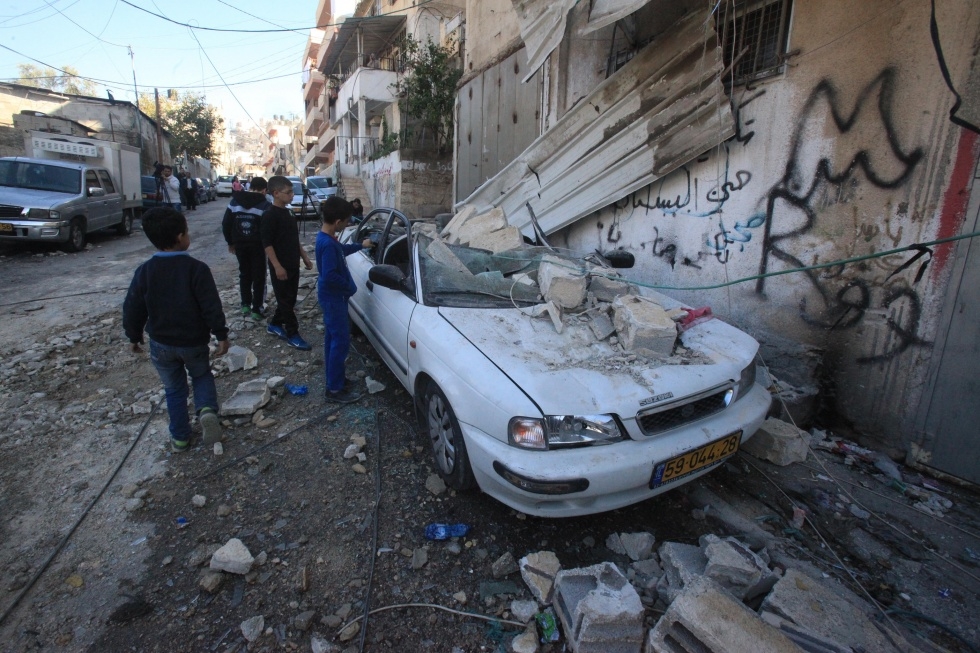
EAST JERUSALEM - In his small, windowless shop in the Silwan neighbourhood of East Jerusalem, Ahmed al-Qareen is visibly nervous. Hovering at the door next to stacked crisp boxes and water bottles, he eyes a vehicle on the road with suspicion, watching as it disappears down the hill.
“We call the settlers here a state within a state,” Ahmed said. “They started to live here with us in 1991. Now they have their own private cars, their weapons, their own laws. Nobody can tell them what to do.”
Five years ago, Ahmed was shot in the leg by one of the Israeli settlers living in Silwan. “They tried to kill me,” he said. “On September 11 2009. It was Ramadan, I was fasting, sleeping. Suddenly, I hear people shouting in the street. I saw two settlers. People said they were beating the children, so I went to fetch my kids.”
Ahmed said that the men pointed a gun at his nine-year-old son first. “I asked them, 'Why'?” he said. “We were shouting. Suddenly, he shot me, with a bullet in my leg. I fell down, and I started bleeding. He came back to me where I was bleeding and where my two sons were crying, and shot me again. Then he ran away.”
After an official inquiry, in a ruling criticised by human rights groups, the Israeli prosecuting office closed the case against Ahmed's assailant, accepting the claim that he had acted in self-defence. A year later, an Israeli security guard – who said he was attacked by stone-throwers – shot 32-year-old Samir Sirhan dead in Silwan, sparking riots in which many Israelis were hurt. The following May, 17-year-old Milad Ayyash was killed by an Israeli guard during clashes in the neighbourhood.
Microcosm of chaos
Silwan is sometimes referred to as the epicentre of Jerusalem's troubles: just a few hundred metres from Al-Aqsa mosque, it’s home to more than 30,000 Palestinians, and a few hundred Israeli settlers, who live in the historic area – largely for ideological reasons – in fortified homes bristling with police and soldiers. This month, 23 more apartments were taken over in this neighbourhood by settlers, who made no secret of the fact that they wanted to see the area claimed by a Jewish majority. Violent clashes between Palestinians and security, inevitably, ensued.
This place of escalating fear and hatred is, increasingly, a microcosm of the chaos that’s engulfing the entire city. Recent weeks have seen a building momentum of attacks in Jerusalem, in scattered locations and directed at seemingly arbitrary civilian targets by what look to be “lone wolf” perpetrators. These are the cars driven into crowds of civilians as they wait for the tram, the random stabbings, and this week’s horrific synagogue attack that left five Israelis “hacked” to death. But none of these events happened in isolation as Palestinians come under daily assault.
Most shocking of these recent assaults was the death of Mohammed Abu Khdeir: a 16-year-old who this summer was abducted from the well-heeled Jerusalem neighbourhood of Shuafat and murdered in revenge for the killing of three settler teenagers. This week, the death of Yusef al-Ramouni, found hanging from a steel bar in the Egged bus he drove for a living, was quickly ruled a case of suicide by Israeli authorities. But almost all Palestinians with whom MEE spoke – schooled, they said, by their experiences of threats, abuse and sometimes physical violence, as well as a total lack of trust in Israeli justice mechanisms – firmly believe al-Ramouni was murdered.Tuesday’s early morning massacre, which was thought to be partly sparked by anger at al-Ramouni’s death, brought the violence to a grim peak. By nightfall, a gang of around 300 Israelis, including former Knesset member Michael Ben Ari, marched through Jerusalem's streets chanting “death to Arabs”, and disturbing reports – including those of a man stabbed by Israelis in Kufr Aqab and a 19-year-old boy shot in the face by West Bank settlers – emerged one after another as dusk fell.
Many East Jerusalemites regard the death of al-Ramouni was a manifestation of years of insecurity, marginalisation and hatred, embodied in the right-wing response to Tuesday’s attack. After his funeral, colleagues started a three day strike expressing their frustration at working in a context where they feel reviled by the government and public alike. The strike was scheduled to end after Wednesday.
“They're against us. They don't want any Palestinians to live in this earth. They want to transfer all the people,” Sami Abu Atrash, one of al-Ramouni’s colleagues, told Middle East Eye. “We work for the Jewish people and help them, all the time, day and night. But the Israelis – and it's not just settlers, it's the government – they're pushing them to kill us, and destroy our houses. It's the system of the government against the Palestinian people.”
“Sometimes if the drivers are working in the night, their wives and children never know for sure if we will come back or not,” Sami’s colleague Bassem continued, still wearing his Egged uniform, a collared shirt and dark blue fleece stitched with the company's logo, as he spoke to MEE at al-Ramouni’s memorial. “In the past, the company has called me and said, 'If you are not coming to work we are going to fire you.’ I replied that, 'I am ready to lose my job, but I am not ready to lose my life.' I am going to work. I’m not going to kill someone, or be killed by someone.”
'They have no place to go'
In Jerusalem, neighbourhoods like Wadi Joz, Silwan and Jabel el-Mukaber, where the Abu Jamal cousins responsible for Tuesday’s attack lived, the sense of despair and frustration is compounded by high levels of unemployment, poverty, and policing that frequently hit the youngest members of the community hardest. Between July and September, an estimated 700 Palestinians were arrested by Israeli authorities in East Jerusalem, 260 of whom were minors, according to a report in Haaretz. And over the past few weeks, the response to attacks on Israeli citizens has been an increased police presence in these areas, including harsher measures for petty crime and unrest, and checkpoints or roadblocks on access points to neighbourhoods.
“Here in Issawiya, the sound bombs, the tear gas, it’s always there,” says Raed Taha, a bus driver from the East Jerusalem neighborhood which sits at the foot of the campus of the prestigious Hebrew University of Jerusalem. “Always in the night, it’s like a war. They strike with gas, deadly strikes, and it goes inside the houses. The boys, they have no place to go. They stay in the street, and the army comes to them, and starts firing gas at them and the plastic coated bullets.”
Police Chief Micky Rosenfeld told MEE that the police policy was necessary and proportionate. “There’s a strong police presence in and around Jerusalem,” he said. “That’s necessary in order to prevent and respond to disturbances in specific neighbourhoods. There have been local disturbances that have been taking place all over since the summer - minors throwing stones, attacking police officers. It’s been going on and on and on. So the decision was made for heightened security that would prevent those incidents from taking place.”
But this is not a justification that speaks to the experience of residents here. For them, the measures are a clear case of collective punishment – a brutal response that aims to make life tough for Palestinians and even, eventually, force them out of the city.
“It’s like they slap you, then say, ‘What’s the problem? You’re not allowed to do anything,’ Mohammed Abed, Raed's friend, said. “Some kids, they’re throwing stones, on the main road, and they want to punish them – That's fine. But there are 15,000, 20,000 people living here. What have all of these people done?”
A sense of collective punishment
The sense among Palestinians that the law does not represent them is compounded by comparative experience. According to Israeli rights organisation Yesh Din, just 7.4 percent of investigations into ideological crimes against Palestinians in the West Bank led to indictment, and 85.2 percent of files were closed when Israeli police failed to follow up on cases with proper care. In Silwan, meanwhile, the family home of Abdel-Rahman al-Shaludi, who killed two civilians and was shot by police when he drove his car into a tram stop last month, was demolished Tuesday morning. Those watching note with anger that, in contrast, the suspected killers of Mohammed Abu Khdeir are being tried in a court.
Mahmoud al-Qareen, a 29-year-old activist from Jerusalem, told MEE that his personal experience has confirmed, repeatedly, that the law works against the Palestinians of East Jerusalem and in favour of Israeli settlers. “A few weeks ago, settlers entered my land and I called the police," he said. "I called them five times, and after the sixth call, when I said I was recording the call, they finally arrived. They arrested me. They said I was throwing stones.
"As an activist, I believe that only the Israeli government now has the power to change the situation. They do what they want to do, and no-one can really stop them," Mahmoud said, adding that he believes Palestinian representation in Jerusalem has been decimated. “A few years ago, the leadership and activists in East Jerusalem started to be organised. But since the last two years, most of them have been arrested. I've been arrested 13 times. Israel has tried to destroy the community building because it's been a threat, and they consider activists illegal, or terrorists.”
Lone wolves?
In the last few weeks, however, it seems that the lack of leadership for Palestinians in Jerusalem has generated an even more alarming phenomenon than organised resistance. Recent terror attacks on Israelis appear to be the responsibility inof individuals operating independently, separate from the work of groups or factions. Some have appeared to have links to groups like Hamas or the PFLP, while acting on their own agency with regard to the attack itself. Commentators, residents and political actors have linked the violence strongly with the context of East Jerusalem, one that is increasingly desperate and which, at present, shows little sign of improvement.
"This is a situation that cries out for Israelis and Palestinians leaders to reach out to each other, and my leadership has burned all bridges," said Daniel Seidemann, an attorney and Jerusalem expert who works extensively with Palestinian communities. "This is a point when Israeli leaders should be reaching out to East Jerusalem leadership, but if they did, they would find that the leadership has been decimated. When Netanyahu pledges action and a hard hand, what has he done so far that he hasn't already done?”
Seidemann has worked in Silwan for more than 20 years, representing Palestinian families who find themselves threatened with eviction by the moves of Israelis into the neighbourhood. His assessment of the spiralling fate of the city is frequently optimistic in the face of relentless bad news. But the desperation on the streets of Jerusalem, he said, has been undeniable for a long time.
"What is on people's minds right now is a situation of total futility and despair. Eighteen year old kids haven't been going out into the streets and clashing with police every night because they're being incited to by their rockstar, Abu Mazen,” he said. “They feel they're a population adrift, that they have no future, that life sucks very much for them. And essentially this is a problem about occupation. And making occupation more tolerable isn't going to cut it.”
Middle East Eye propose une couverture et une analyse indépendantes et incomparables du Moyen-Orient, de l’Afrique du Nord et d’autres régions du monde. Pour en savoir plus sur la reprise de ce contenu et les frais qui s’appliquent, veuillez remplir ce formulaire [en anglais]. Pour en savoir plus sur MEE, cliquez ici [en anglais].


